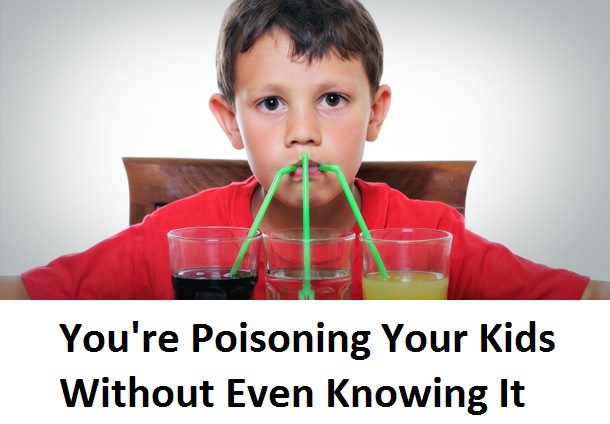You’re Poisoning Your Kids Without Even Knowing It
What if I told you the juice boxes and fruit juices you give your kids contain poison? You’d be pretty upset, right? In fact, you’d probably stop using those products altogether, correct? Well, get ready for the hard truth. While you might be thinking you are giving your kids a healthy option over other drinks such as those containing caffeine like sodas, there’s a very high percentage that what you are giving them could be just as bad if not worse.
You can think of sugar as a drug—the more you have of it, the more you want. Ingesting something high in sugar spikes glucose levels which in turn will increase insulin production. The influx of insulin that lingers in the system creates a craving mechanism leaving you wanting more sugar. As you can imagine, this all leads to a cyclical pattern.

So where does the “poison” part come into play? Poison, in this case, ends up being sugar. Without even knowing it, 16% of your child’s daily caloric intake could be coming from sugar. The World Health Organization has set guidelines that recommend that only 5% of an individual’s total caloric intake should come from sugars. Many parents go grocery shopping and pick up juice boxes or fruit juice for their kids thinking it is healthy when in fact it contains an insane of sugar. There’s a logical reason why you find your kids will drink those items more than water—the sugar makes them taste good. The old saying if it tastes good, it’s probably not good for you rings true. Just because the label says “100 percent juice,” “no sugar added,” or “organic” doesn’t mean it’s good for you or them. It’s deceptive advertising to get you to purchase their product. On average, most people will underestimate the sugar content in fruit juices by around 48%.
What can sugar do to a child?
• Increase the chance of obesity
• Increase the chance of diabetes
• Increase the chance of tooth decay
• Increase the risk of heart disease
• Can cause cold/allergy-like symptoms
• Can weaken the immune system
• Can lead to behavioral problems due to sugar-sensitivity
Pediatrician Barbara Frankowski, M.D. advises the following age-by-age limits for consumption of fruit juices:
• No fruit juice for babies under 6 months
• No more than 6 ounces a day for babies 6 months to 1 year
• No more than 6 ounces a day for kids 1 to 6
• No more than 12 ounces a day for kids over 6
The Mayo Clinic breaks it down even further as teaspoons and calories of sugar in the chart below found on their website.

So what can be done to help keep your kids healthy while giving them something they will drink? Stop giving them those juice boxes/drinks all together. Or if you MUST give it to them (whatever your excuse is), then dilute it with water. It would still give the taste of the beverage (while muted slightly) that they are used to, while cutting back on the overall sugar content as well as allowing the fruit juice/drink to last longer—stretching out your dollar. Even sports drinks marketed by some of your kid’s favorite athletes are nothing more than sugar water with some electrolytes thrown in. You can just as easily take water and add fruit to it in order to give it natural flavoring and give them the same benefits as the sugary drinks they are accustomed to drinking every day without all of the empty calories that come along with them.
Click here to continue reading…


*Disclosure: This article may contain affiliate links or ads, which means we earn a small commission at no extra cost to you if you make a purchase through these links. These commissions help support the operation and maintenance of our website, allowing us to continue producing free valuable content. Your support is genuinely appreciated, whether you choose to use our links or not. Thank you for being a part of our community and enjoying our content.
PLEASE CONSIDER SHARING THIS ON YOUR SOCIAL MEDIA TO HELP OTHERS LEARN MORE ABOUT THIS TOPIC. SIMPLY CLICK BELOW!

